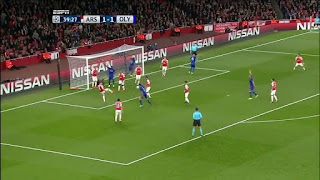The Additional Assistant Referee (AAR) system has been introduced in the UEFA's top competitions for several years. According to the official guidelines, the AARs were supposed to only communicate with the referee through the communication system. However, the new FIFA Laws of the Game (page 86) allow AARs, in some instances, to use “discreet hand signals that may give valuable support to the referee. The signals should have a clear meaning that should have been discussed and agreed upon in the pre-match discussion". Based on that and following some recent goal-no goal situations in the Champions League, UEFA Chief Refereeing Officer, Pierluigi Collina, advised all AARs that, in addition to using the communication system, they must clearly signal for a goal with the left arm perpendicular to the goal line pointing towards the centre of the field (flagstick in the left hand is also required), as done by Danny Makkelie in the recent Champions League match Arsenal - Olympiakos (photo).
UEFA submitted an official proposal to the IFAB to implement the following text in the new edition of the Laws of the Game:
"When the ball has wholly crossed the goal line within the goal, the AAR must:
- immediately inform the referee via the communication system that a goal should be awarded,
- make a clear signal with the left arm perpendicular to the goal line pointing towards the centre of the field (flagstick in the left hand is also required).
The referee will make the final decision."
Source: Daily Mail


.jpg)
